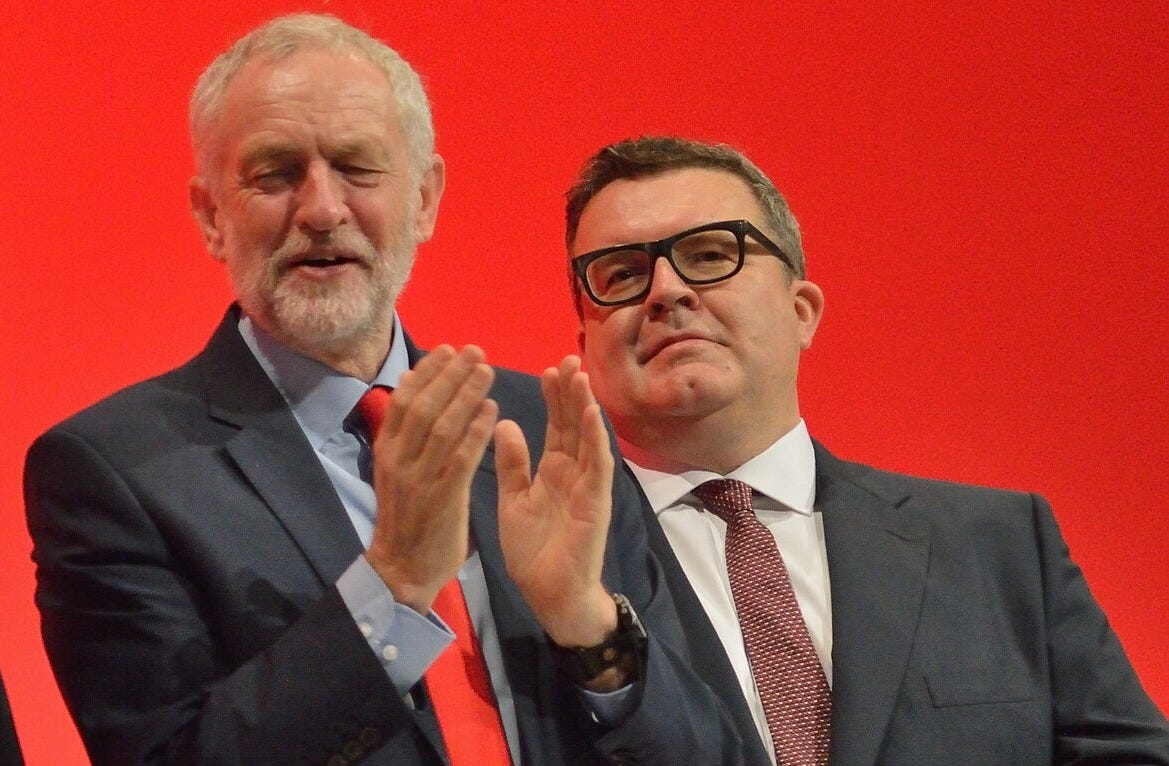The Labour Party's favourite existential crisis
The deputy leadership shouldn't matter. History says otherwise.
If you woke up this morning and your first thought was, “Jack, why does it matter who is deputy leader of the Labour Party?” then my advice is to go back to bed, call your GP and repeat those exact words to the receptionist. Forget ambulance delays and NHS waiting lists — some men in white coats will be round shortly. You are safe. You are loved. Everything is going to be okay.
It’s a shame, really, because this isn’t even the right question. A bit like asking your spouse why they chose that specific spot in an empty car park. It’s an emotional thing. Or perhaps it’s more like the argument you keep having about the dishwasher, because you can’t bear to discuss your real problems. Anyway, all you need to know is that the Labour Party cares deeply who its deputy leader is. Once you accept this fact, life becomes easier.
The more pertinent question might be: why would anyone want the job? This is not the United States — the deputy leader does not automatically become prime minister if a vacancy arises1. First, because Labour is, let’s face it, usually in opposition. But more importantly, it’s just not that kind of role.
Still, the party has a rulebook and it could not be clearer: the deputy leader is something of a big deal. He or she is elected in their own right, and with that comes a mandate independent of the leader. There is an automatic seat on the party’s ruling National Executive Committee (NEC) and the opportunity to stand in for the leader at showpiece events such as Prime Minister’s Questions.
Nevertheless, like most institutions, Labour is governed more by politics than laws. For example, though it is stipulated that the leader “shall consult the deputy leader on a regular basis”, that rather depends on the circumstances. Indeed, such was the breakdown in the relationship between Jeremy Corbyn and his deputy, Tom Watson, that in 2019, Jon Lansman, founder of the pro-Corbyn pressure group, Momentum, tabled a motion at the NEC to abolish the role of deputy leader entirely.
Welcome to the Labour Party, where every faction has held every conceivable position on the party rulebook (One member one vote, trigger ballots, centralisation, conference changes etc.) depending on whether their gang is in charge of the apparatus or out in the wilderness.
Perhaps the most famous election in the party’s history came in 1981, when Tony Benn challenged Denis Healey for the deputy leadership. It was gruesome. A challenge was permitted under the new party constitution for which Benn had fought. Benn was also keen to point out that Healey, the incumbent, had secured the position unopposed, when Michael Foot won the 1980 leadership election.
The timing was far from ideal. The party had was shaken by the Limehouse Declaration of January 1981, when Roy Jenkins, David Owen, Shirley Williams and Bill Rodgers announced their intention to leave the party and form the SDP. Neil Kinnock called Benn’s challenge “a destructive act” that couldn’t be “anything but disaster”. For his part, Jack Straw described the years between 1981 and 1983 as the party experiencing a “collective nervous breakdown”.
2025 is, of course, not 1981. For one thing, Labour is in government. The party’s centre controls the leadership, the NEC and many of the top cabinet positions. The deputy leadership is vacant, rather than an incumbent facing a challenge. But the party is rarely more than a tray of room-temperature Sauvignon Blanc away from meltdown.
Without doubt, the events of the past week have been bad for the Labour leader. While not exactly ideological or temperamental soulmates — recall that Starmer tried and failed to demote Rayner following defeat at the 2021 Hartlepool by-election — she became a vital ally. A woman of the party’s left who fought political battles on behalf of the centre. Warm and charismatic in ways her boss was not. And, as the assumed successor, she made Starmer’s position safer, rather than weaker.
Not only is that all over, but there is set to be an election in which the various candidates will get on stage and — some more crudely than others — define themselves against the leadership, whether on fiscal policy, foreign policy, immigration or anything else they think will rouse the membership.
Only this morning, Louise Haigh, who was essentially forced to resign as transport secretary last November over a decade-old fraud conviction, has written a piece for the New Statesman, in which she urges the chancellor to ditch her fiscal rules. That is, the government’s entire economic agenda, or in Haigh’s words, “straitjacket”. Expect more of this sort of thing. Emily Thornberry, one of the few shadow cabinet ministers not to be offered a job in government, is unlikely to be a wholly uncritical candidate.
A mea culpa. After telling you it doesn’t matter who is deputy leader of the Labour Party, I have proceeded to write upwards of 800 words on that very subject. For anyone still here, Healey secured victory over Benn by a margin of 50.4% to 49.6%. “Half a hair of an eyebrow,” the famously bushy-browed Healey later reflected. And, as we know, the Labour Party lived happily ever after.
In this case, they won’t even be deputy prime minister. That has already gone to David Lammy.






The Labour Party did not live happily ever after. It was out of power for 18 years during which time the Trade Union movement was eviscerated. I was given early retirement at 56 and found I was not entitled to unemployment benefits because I had a small pension (try living on £3000 a year). The unwillingness of practically all parties to stand down their candidate in favour of a similar party was a major handicap in 1987 and 1992. Labour and the LibDems both shot each other in the foot rather than win both elections. My last election as an active supporter was in 1983 in Stevenage where the LibDems bumped into Labour on a regular basis. We never saw the Tory candidate yet he won the seat on the promise of Council House sales.
.